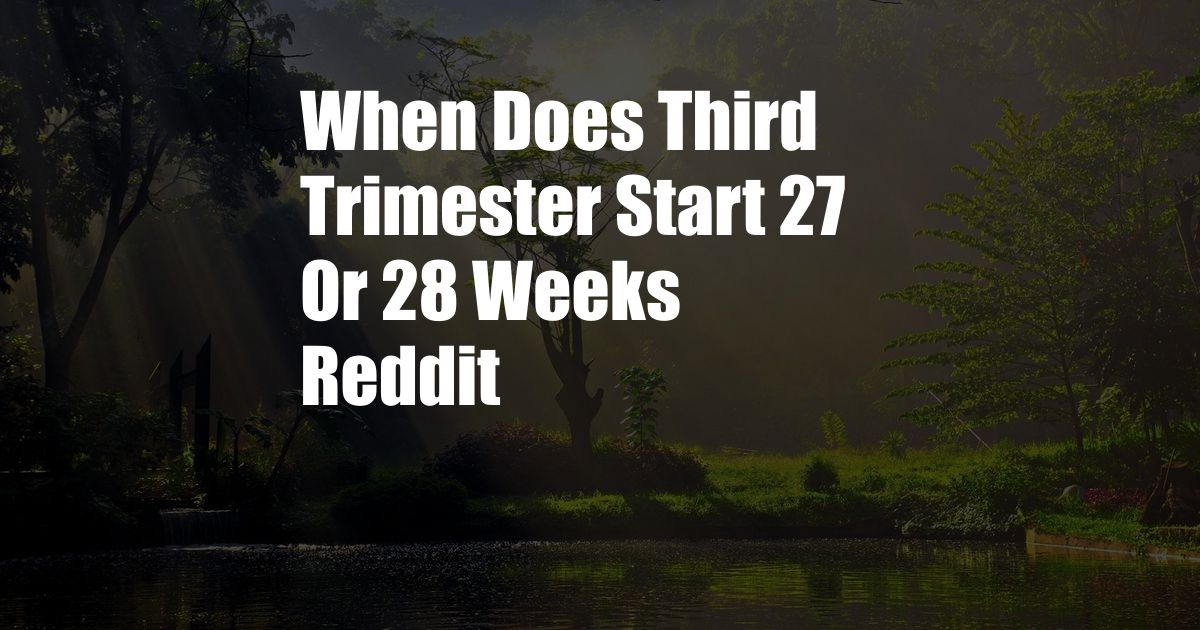
When Does the Third Trimester Start: 27 or 28 Weeks?
In the midst of the whirlwind of pregnancy, expectant mothers navigate a sea of information, eagerly seeking answers to guide them through this transformative journey. One common question that arises is the commencement of the third trimester. Is it 27 or 28 weeks? The answer may vary depending on who you ask, as medical practices and cultural norms evolve over time. In this article, we delve into the nuances surrounding this topic, exploring its historical background, current medical consensus, and practical implications for expectant mothers.
Navigating the complexities of pregnancy, it’s crucial to understand the significance of each trimester. The first trimester spans from conception to week 12 and is characterized by rapid embryonic development and morning sickness. The second trimester, from week 13 to week 28, brings relief from nausea, increased energy, and the visible growth of the baby bump. Finally, the third trimester, traditionally considered the final leg of the pregnancy journey, extends from week 29 to week 40, culminating in labor and delivery.
28 Weeks: The Medical Consensus
Historically, the third trimester was considered to begin at week 27 based on the lunar calendar, which consists of 28-day cycles. However, modern medical practice has shifted towards a 40-week gestation period, placing the start of the third trimester at week 28. This alignment is supported by the World Health Organization and the American College of Obstetricians and Gynecologists (ACOG). By beginning the third trimester at 28 weeks, healthcare providers can more accurately monitor fetal development, identify potential complications, and prepare expectant mothers for labor and delivery.
The third trimester is a time of significant fetal growth and preparation for birth. The baby’s lungs, brain, and other organs continue to mature, and the mother’s body undergoes changes to accommodate the growing fetus, such as increased blood volume and changes in hormone levels. Regular prenatal care becomes even more critical during this final stretch, as healthcare providers closely monitor the well-being of both the mother and the baby.
27 Weeks: Traditional and Cultural Perspectives
Despite the medical consensus on 28 weeks as the start of the third trimester, some cultural and traditional practices continue to adhere to the notion of 27 weeks. In certain Asian cultures, for instance, the third trimester is believed to begin at 27 weeks, and expectant mothers are encouraged to observe special customs and dietary restrictions during this period. While these beliefs do not align with modern medical guidelines, they reflect the rich tapestry of cultural traditions surrounding pregnancy and childbirth.
In addition to cultural influences, personal experiences can also shape an expectant mother’s perception of when the third trimester begins. Some women may feel significant physical changes or a sense of anticipation as early as 27 weeks, prompting them to consider themselves in the third trimester. Ultimately, it’s important for expectant mothers to be aware of both the medical and traditional perspectives on this topic and to discuss any concerns or questions with their healthcare provider.
Tips and Expert Advice for Expectant Mothers
As expectant mothers approach the third trimester, it’s essential to prioritize self-care and prepare for the upcoming challenges and joys that lie ahead. Here are some tips and expert advice to help you navigate this final stage of pregnancy:
Stay hydrated.
As your blood volume increases, staying hydrated is crucial. Aim for eight glasses of water daily to maintain optimal fluid levels and support your growing baby.
Maintain a healthy diet.
Eating a balanced diet rich in fruits, vegetables, and lean protein is essential for both you and your baby. Focus on nutrient-dense foods that support fetal growth and your overall well-being.
Get regular exercise.
Exercise not only helps you stay fit during pregnancy but also prepares your body for labor and delivery. Choose low-impact activities such as walking, swimming, or prenatal yoga.
Listen to your body.
As your pregnancy progresses, pay attention to your body’s signals. If you experience any discomfort or changes in your condition, don’t hesitate to contact your healthcare provider.
Prepare for labor and delivery.
Take childbirth classes, read books, and discuss your birth plan with your partner or support person. Knowing what to expect can help reduce anxiety and empower you during labor.
Find support.
Connect with other expectant mothers, join support groups, or seek counseling if you need emotional support or have any concerns during this time.
FAQs on the Third Trimester
To further clarify the topic, here are some frequently asked questions and concise answers:
- Q: What are the key physical changes in the third trimester?
- A: Rapid fetal growth, increased blood volume, changes in hormone levels, and a visible baby bump.
- Q: How often should I see my healthcare provider during the third trimester?
- A: Prenatal visits typically occur every two to four weeks, becoming more frequent as the due date approaches.
- Q: What are some common discomforts in the third trimester and how can I manage them?
- A: Back pain, swelling, hemorrhoids, and heartburn are common. Try prenatal massages, warm baths, hemorrhoid creams, and antacids as needed.
Conclusion
The commencement of the third trimester, whether 27 or 28 weeks, is a significant milestone in the pregnancy journey. By understanding the medical consensus, cultural perspectives, and practical implications, expectant mothers can navigate this final stage with confidence and a deeper understanding of its importance. Remember to prioritize self-care, seek expert advice when needed, and embrace the support of loved ones and healthcare providers. Whether you’re counting down from 27 or 28 weeks, the third trimester is a time of remarkable transformation and preparation for the arrival of your precious little one.
Is there anything else you’d like to know about the third trimester? Share your thoughts and questions in the comments below, and let’s continue the conversation.